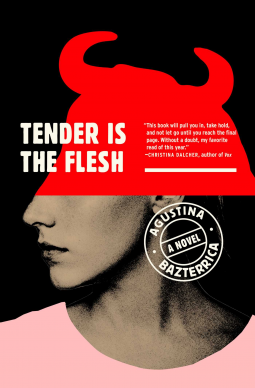A horror story. [Tender Is the Flesh by Agustina Bazterrica]
Working at the local processing plant, Marcos is in the business of slaughtering humans—though no one calls them that anymore.
His wife has left him, his father is sinking into dementia, and Marcos tries not to think too hard about how he makes a living. After all, it happened so quickly. First, it was reported that an infectious virus has made all animal meat poisonous to humans. Then governments initiated the “Transition.” Now, eating human meat—“special meat”—is legal. Marcos tries to stick to numbers, consignments, processing.
Then one day he’s given a gift: a live specimen of the finest quality. Though he’s aware that any form of personal contact is forbidden on pain of death, little by little he starts to treat her like a human being. And soon, he becomes tortured by what has been lost—and what might still be saved.
On the surface a reader would probably expect this to read as anti-meat-eating propaganda. But it doesn't. Trying to equate cannibalism to eating other animals just doesn't work. Animals eat other animals. We understand that some animals, like the Black Widow spider, eat their male counterparts as part of their reproductive cycle. So that argument alone isn't enough to turn me into a herbivore.
Agustina Bazterrica's Tender Is the Flesh did, however, inspire a load of philosophical questions across a spectrum of topics. The analogies to meat processing, human trafficking, caste systems and prejudice, the human capacity for cruelty, the hypocrisy innate to a society. All of it - just, wow. In a dystopia where cannibalism is the norm, where large-scale government manipulation and control through lies are the norm, we live a few months through the life of a meat processor. Marcos, our protagonist, is a selfish man. A selfish hypocrites among peers more and less extreme. Through him we see that the dystopia is known to be horrid, but accepted. No revolution against the system, just a navigation through.
A translation of Bazterrica's 2017 Cadáver Exquisito, here translated by Sarah Moses, the language flow was superb. What continually disgusted me was the disregard for bodily autonomy and life, which in themselves can be applied to just about anything. I sat with a discomfort that kept the book on my mind. I was disgusted with the Marcos throughout and never felt any empathy for him or his storyline. As horrifically disturbing as the book was, there was no real plot. No real consequences. I had to suspend a good amount of disbelief to buy into the story. This was a giant thought experiment. So thought-provoking? Yes. Enough to solidly recommend? No. 3 stars from me.
His wife has left him, his father is sinking into dementia, and Marcos tries not to think too hard about how he makes a living. After all, it happened so quickly. First, it was reported that an infectious virus has made all animal meat poisonous to humans. Then governments initiated the “Transition.” Now, eating human meat—“special meat”—is legal. Marcos tries to stick to numbers, consignments, processing.
Then one day he’s given a gift: a live specimen of the finest quality. Though he’s aware that any form of personal contact is forbidden on pain of death, little by little he starts to treat her like a human being. And soon, he becomes tortured by what has been lost—and what might still be saved.
On the surface a reader would probably expect this to read as anti-meat-eating propaganda. But it doesn't. Trying to equate cannibalism to eating other animals just doesn't work. Animals eat other animals. We understand that some animals, like the Black Widow spider, eat their male counterparts as part of their reproductive cycle. So that argument alone isn't enough to turn me into a herbivore.
Agustina Bazterrica's Tender Is the Flesh did, however, inspire a load of philosophical questions across a spectrum of topics. The analogies to meat processing, human trafficking, caste systems and prejudice, the human capacity for cruelty, the hypocrisy innate to a society. All of it - just, wow. In a dystopia where cannibalism is the norm, where large-scale government manipulation and control through lies are the norm, we live a few months through the life of a meat processor. Marcos, our protagonist, is a selfish man. A selfish hypocrites among peers more and less extreme. Through him we see that the dystopia is known to be horrid, but accepted. No revolution against the system, just a navigation through.
A translation of Bazterrica's 2017 Cadáver Exquisito, here translated by Sarah Moses, the language flow was superb. What continually disgusted me was the disregard for bodily autonomy and life, which in themselves can be applied to just about anything. I sat with a discomfort that kept the book on my mind. I was disgusted with the Marcos throughout and never felt any empathy for him or his storyline. As horrifically disturbing as the book was, there was no real plot. No real consequences. I had to suspend a good amount of disbelief to buy into the story. This was a giant thought experiment. So thought-provoking? Yes. Enough to solidly recommend? No. 3 stars from me.
Scribner's English translation of Tender is the Flesh is due for publication today, August 04, 2020.

Comments
Post a Comment